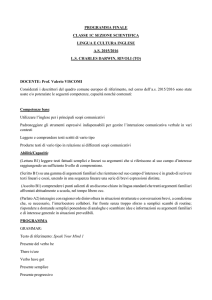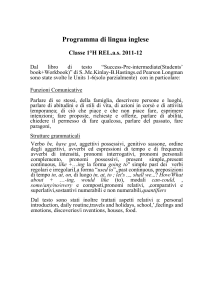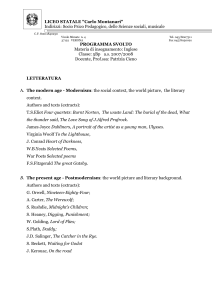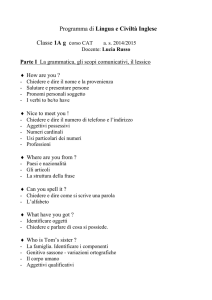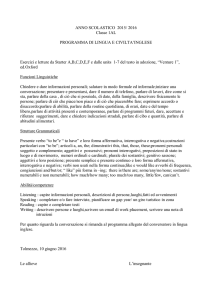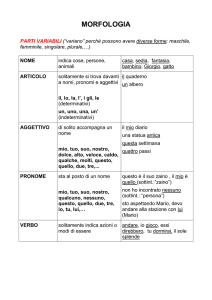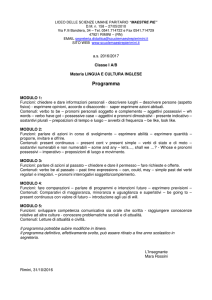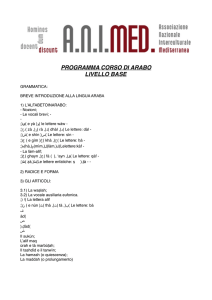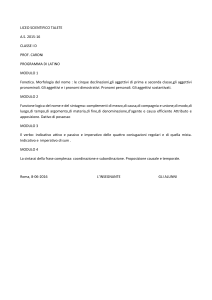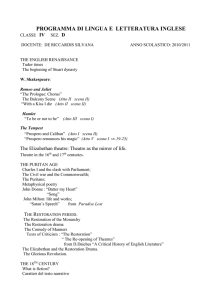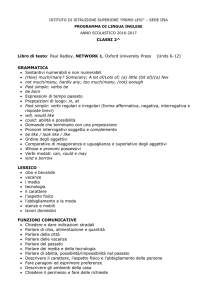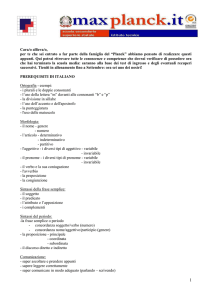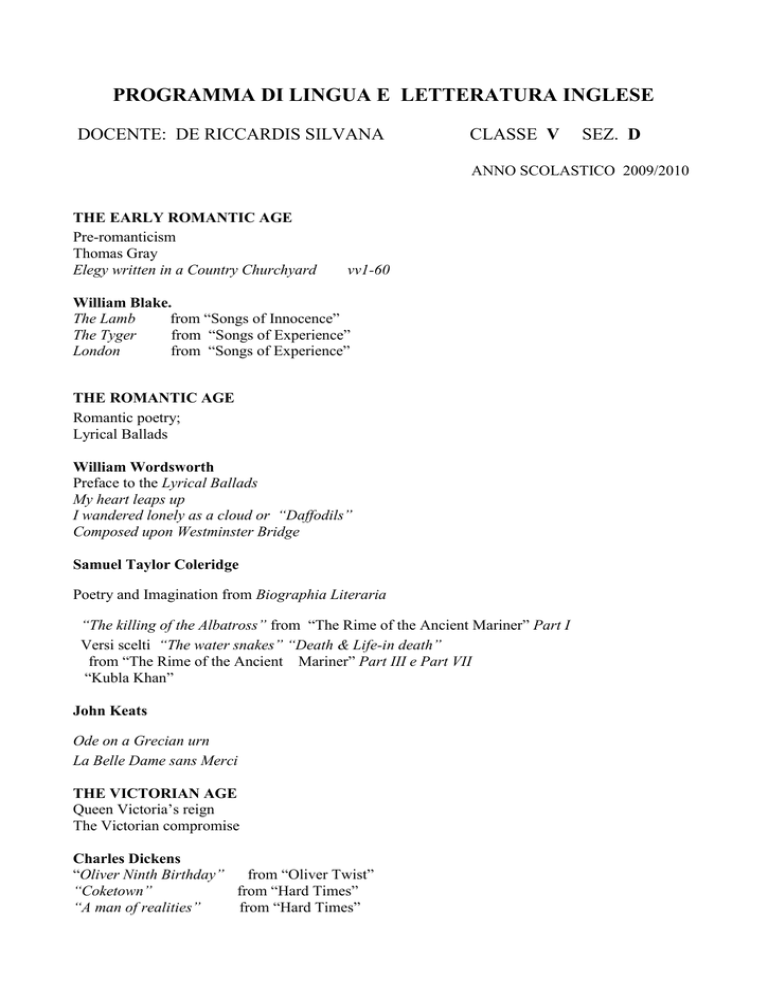
PROGRAMMA DI LINGUA E LETTERATURA INGLESE
DOCENTE: DE RICCARDIS SILVANA
CLASSE V
SEZ. D
ANNO SCOLASTICO 2009/2010
THE EARLY ROMANTIC AGE
Pre-romanticism
Thomas Gray
Elegy written in a Country Churchyard
vv1-60
William Blake.
The Lamb
from “Songs of Innocence”
The Tyger
from “Songs of Experience”
London
from “Songs of Experience”
THE ROMANTIC AGE
Romantic poetry;
Lyrical Ballads
William Wordsworth
Preface to the Lyrical Ballads
My heart leaps up
I wandered lonely as a cloud or “Daffodils”
Composed upon Westminster Bridge
Samuel Taylor Coleridge
Poetry and Imagination from Biographia Literaria
“The killing of the Albatross” from “The Rime of the Ancient Mariner” Part I
Versi scelti “The water snakes” “Death & Life-in death”
from “The Rime of the Ancient Mariner” Part III e Part VII
“Kubla Khan”
John Keats
Ode on a Grecian urn
La Belle Dame sans Merci
THE VICTORIAN AGE
Queen Victoria’s reign
The Victorian compromise
Charles Dickens
“Oliver Ninth Birthday”
from “Oliver Twist”
“Coketown”
from “Hard Times”
“A man of realities”
from “Hard Times”
Thomas Hardy
“At Stonehenge”
from “Tess of the D’Urbervilles”
Aestheticism and Decadence
Oscar Wilde
“Basil’s study”
“I would give my soul”
“Dorian’s Death”
from “The Picture of Dorian Gray”
THE MODERN AGE
Anxiety and Rebellion
The War Poets
R. Brooke
“The Soldier”
Owen
“Dulce et Decorum est”
F. Sassoon
“Survivors”
Virginia Woolf
“To the Lighthouse”
“My dear stand still”
“Clarissa and Septimus”
from “To the Lighthouse”
from “Mrs Dalloway”
James Joyce
“Eveline”
from “Dubliners”
“She was fast asleep”
from “The Dead”
from “Dubliners”
“ The Funeral”
“Molly’s monologue”
from “Ulysses”
George Orwell
“The Execution”
from “Animal Farm”
“Big Brother is watching you”
“The Destruction of Words” from “Nineteen Eighty-Four”
CLASSE IV
PROGRAMMA DI LINGUA E LETTERATURA INGLESE
SEZ. D
DOCENTE: DE RICCARDIS SILVANA
ANNO SCOLASTICO: 2009/2010
THE ENGLISH RENAISSANCE
Tudor times
The beginning of Stuart dynasty
W. Shakespeare:
The bard of Avon
The poet
The dramatist
Macbeth
Atto I scena I “The Three Witches”
Atto V scena V Macbeth’s last monologue
Hamlet
Atto III scena II “To be or not to be…”
The Tempest
Atto I scena II Prospero and Caliban
THE PURITAN AGE
Charles I and the clash with Parliament;
The Civil war and the Commonwealth;
The Puritans;
Metaphysical poetry
John Donne : “Batter my Heart”
“Song”
John Milton: life and works;
texts “On his Blindness”
“Satan’s Speech” from Paradise Lost
THE RESTORATION PERIOD.
The Restoration of the Monarchy
The Restoration drama
The Comedy of Manners
Congreve: “The Sealing of the Deeds”
Texts of Criticism : “The Restoration”
“ The Re-opening of Theatres”
from D.Daiches “A Critical History of English Literature”
The Elizabethan and the Restoration Drama.
The Glorious Revolution.
THE 18TH CENTURY
What is fiction?
Caratteri del testo narrativo
The Augustan age;
The age of prose and journalism.
Steele and Addison
“Women’s Hair-styles” from The Spectator
THE
RISE OF NOVEL.
Daniel Defoe: life and works;
texts “Friday”
“ I was born of a good family”
“Moll becomes a thief”
from Robinson Crusoe
from Moll Flanders
Jonathan Swift: life and works;
texts “The Inventory”
“The smell of Yahoos”
from Gulliver’s Travels
Samuel Richardson: life and works;
texts “Virtue and Goodness” from Pamela
Henry Fielding: life and works;
texts “A Robbery”
from Tom Jones
“The birth of our hero”
from Jonathan Wilde the Great
“You are a Handsome Young Fellow” from Joseph Andrews.
Laurence Sterne : life and works;
THE EARLY ROMANTIC AGE
The American Revolution.
The Agricultural and Industrial Revolution
Attività di listening, speaking, reading and writing dal testo Challanges.
Unit 4 : Identity Crisis
- parlare di sentimenti e relazioni
- sintetizzare un testo
Unit
5 : Keep Smiling
- parlare di azioni abituali relative al passato e cambiamenti
- narrare una storia
Unit 6 : Boy meets girl
- conoscere e conversare con nuovi amici
- descrivere situazioni ipotetiche e/o immaginarie (first & second conditional)
- scrivere una lettera formale e un CV
Literary texts: “ Sentry”, “Open Window”, “The Unicorn”, “The Soft Voice of the Serpent”
PROGRAMMA DI LINGUA E LETTERATURA INGLESE
CLASSE III SEZ. D
DOCENTE: DE RICCARDIS SILVANA
ANNO SCOLASTICO: 2009/2010
Storia della letteratura:
The Origins: Celtic Britain, The Romans, The Anglosaxons, The Conversion to Christianity, The
Vikings, Poems and Chronicles.
The Epic poem and the Elegy .
Anglosaxon literature: Beowulf
Text : Beowulf and the Dragon: the Fight
Wiglaf and Beowulf
The Middle Ages: The Norman Conquest and Feudalism, Henry II, reforms and Becket,
Magna Charta
The Medieval Ballad :
Text : “Lord Randal”
The medieval drama: Miracle and Mistery plays, Morality plays and Interludes.
Text : “The Book of Count” from Everyman
The Medieval Narrative Poem : The Canterbury Tales
Geoffrey Chaucer
Texts: “The General Prologue”
“The Merchant”
“The Prioress”
from The Canterbury Tales
What is poetry?
Caratteri del testo poetico.
The Sonnet: the Petrarchan and Elizabethan sonnet.
Texts: “ I find no peace” by Wyatt
“One day I wrote her name” by E. Spenser
“My Mistress’ eyes” by W. Shakespeare
“Shall I compare thee” by W. Shakespeare
“Like as the waves” by W. Shakespeare
W. Shakespeare:
Sonnets
Themes
Style
Romeo and Juliet
TESTI : “Harry Potter and the Goblet of Fire”, “Stonehenge”
Attività di listening, speaking, reading and writing dal testo Challanges.
Unit A : Meeting People
Unit B : Talking about countries and cities.
Unit 1: Express yourself
Shakira
- describing a person
- writing a biography about a famous person.
Unit 2:
Tell the Truth
Hollywood
- expressing an opinion about films
- talking about films
Unit 3 : Surviving school
It pays…to study
- talking about the ideal school
- describing a picture.
PROGRAMMA DI LINGUA E CIVILTA’ INGLESE
CLASSE II SEZ. D
DOCENTE: DE RICCARDIS SILVANA
ANNO SCOLASTICO: 2009/2010
FUNZIONI LINGUISTICHE
-
descrivere persone (aspetto fisico e carattere);
parlare di azioni abituali;
esprimere azioni in svolgimento;
chiedere e dire l’ora;
dire ciò che piace/non piace;
esprimere abilità;
parlare di una sequenza di eventi passati;
parlare delle condizioni atmosferiche;
dire quando qualcosa avvenne;
parlare di programmi futuri;
prendere accordi per un prossimo futuro;
fare paragoni esprimendo preferenze.
parlare di progetti e intenzioni per il futuro;
parlare di obblighi e proibizioni;
dire che non è necessario fare qualcosa;
descrivere fatti e luoghi ;
chiedere e dare consigli.
fare promesse;
fare previsioni;
fare deduzioni:
parlare di avvenimenti appena trascorsi;
parlare di avvenimenti iniziati nel passato ma ancora in corso;
parlare di cose possibili ma non certe;
parlare della propria personalità e di quella altrui.
esprimere accordo e disaccordo;
parlare di condizioni e delle loro conseguenze;
parlare di azioni o situazioni in corso nel passato;
parlare di situazioni ipotetiche;
esprimere probabilità;
esprimere opinioni.
Testo di riferimento “SUCCESS” di S. Mc Kinlay, R. Hastings edito da Pearson Longman, vol.2
UD da 1 a 10 e 12 dello student’s book e del workbook. Culture Shock 1, 3, 4, 6, 7.
ELEMENTI DI GRAMMATICA
Present Simple
Present Continuous
Past Simple
Past Continuous
Present Perfect
Present Perfect Continuous
Future: be going to
shall and will
present continuous
Futuri correlati
WH questions
Question Tags
Verbi modali: can, could, able to,
must, have to,
may ,might, must, can’t,
Nomi numerabili e non numerabili
Pronomi personali soggetto e complemento
Pronomi possessivi
Myself, yourself
Numeri cardinali e ordinali
Avverbi e aggettivi
Aggettivi comparativi
Aggettivi superlativi
Comparativo di uguaglianza
Avverbi di frequenza
Passivo
Periodo ipotetico
Relative clauses
Dal testo di grammatica “New Total Grammar” di Derek Sellen edito da Black Cat- Cideb
UD: da17 a 24; 26,; da 30 a 34; 39, 43, 44,; da 53 a 56; da 65 a 67; 71, 72, 76, 77, 78, 81, 83; da
107 a 111, 139, 143, 144, da 148 a 151, 153.
PROGRAMMA DI LINGUA E CIVILTA’ INGLESE
CLASSE I SEZ. D
DOCENTE: DE RICCARDIS SILVANA
ANNO SCOLASTICO: 2009/2010
FUNZIONI LINGUISTICHE
- salutare e presentarsi;
- chiedere e fornire informazioni personali (età, numero di telefono, nazionalità, professione);
- chiedere e dare informazioni su paesi e città, sul tempo atmosferico;
- chiedere e dare informazioni sulla propria famiglia;
- parlare delle cose che si possiedono;
- ordinare cibi e bevande;
- chiedere e dire il prezzo;
- chiedere e dire l’ora;
- chiedere e dare informazioni su ciò che sa / non sa fare;
- parlare delle attività del tempo libero.
- descrivere cose e persone;
- parlare delle proprie e altrui preferenze (sport, film, musica);
- parlare della routine quotidiana propria e altrui;
- parlare della frequenza delle azioni;
- esprimere abilità;
- descrivere ciò che un compagno sa/non sa fare;
- invitare qualcuno, accettare, rifiutare;
- suggerire alternative, accettare, rifiutare;
- esprimere preferenze;
- esprimere azioni in svolgimento;
- parlare delle condizioni atmosferiche;
- parlare di eventi passati;
- parlare di personaggi famosi del passato;
- formulare domande e risposte su eventi passati;
- fare paragoni esprimendo preferenze;
- parlare di progetti e intenzioni per il futuro;
- prendere accordi per un prossimo futuro.
Testo di riferimento “SUCCESS” vol 1 ed. Pearson Longman
UD 1-10 dello student’s book e del workbook. Culture Shock 2 e 3.
-
ELEMENTI DI GRAMMATICA
Pronomi personali soggetto;
verbo “to be” : presente;
risposte brevi;
articolo indeterminativo;
articolo determinativo;
plurale dei nomi;
aggettivi e pronomi possessivi;
aggettivi e pronomi dimostrativi;
verbo “can”;
verbo “to have”: presente;
presente semplice dei verbi: forma affermativa, negativa e interrogativa;
verbo “to like”;
forma in “ing” (gerundio);
pronomi personali complemento;
genitivo sassone;
preposizioni di tempo;
avverbi di frequenza;
there is /there are;
presente progressivo: forma affermativa, negativa e interrogativa;
nomi numerabili e non numerabili;
preposizioni di luogo;
imperativo;
verbo “to be”: passato;
passato dei verbi regolari e irregolari: forma affermativa, negativa e interrogativa.
numeri cardinali e ordinali
comparativo di maggioranza e di minoranza
superlativo relativo
futro espresso con “going to”
present continuous con valore di futuro.
Dal testo di grammatica “New Total Grammar” di Derek Sellen edito da Black Cat- Cideb
UD: da1 a 12; 14, 15, 16, 31, 54, 55, 56, 62, 65; da 95 a 103.

